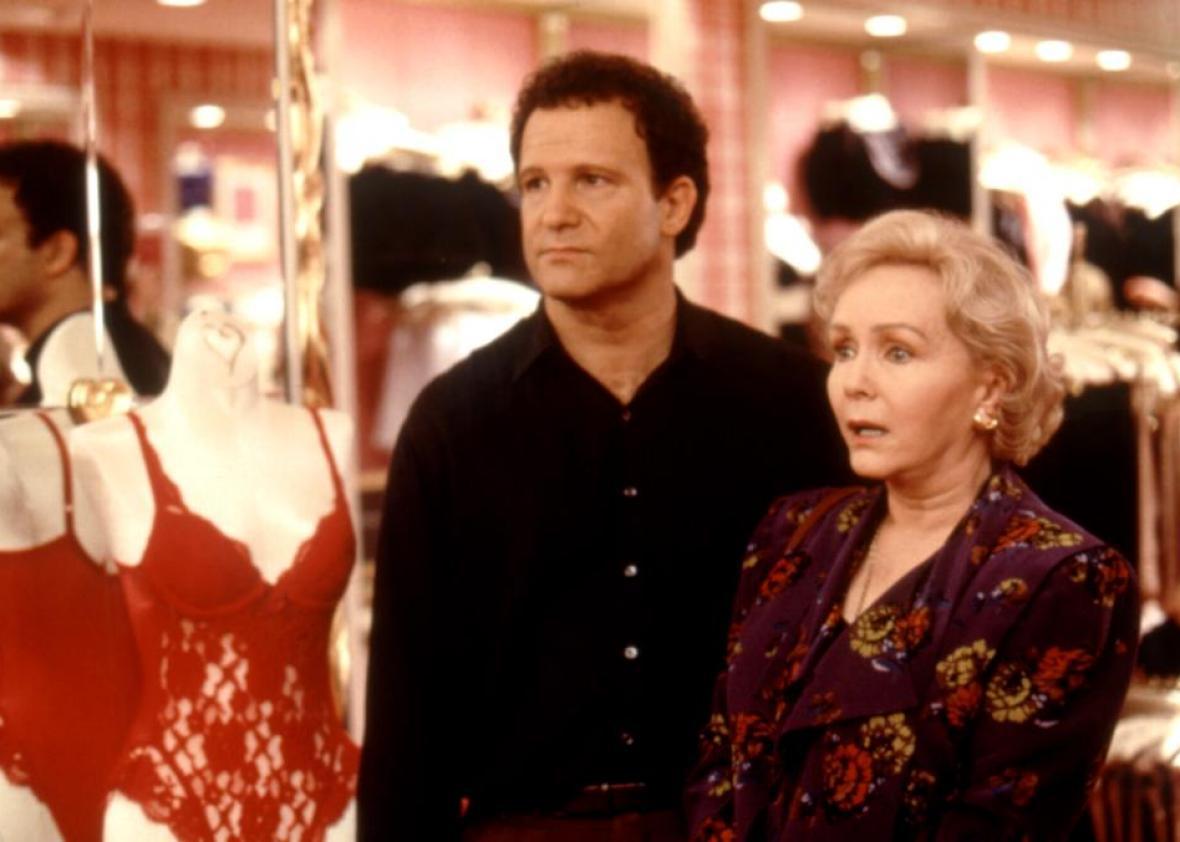Inevitably, news of Debbie Reynolds’ death has prompted poignant reminders of the late, great actress’ contributions to the Hollywood musical. From Singin’ in the Rain to The Unsinkable Molly Brown, it’s safe to say that reliving these iconic, joyful performances can feel damn near essential as we continue to grapple with such seismic experiences of loss. (Please end, 2016.) They can be enjoyed over and over, comfortable in their simplicity and beyond impressive in their execution. But there’s much more to celebrate within Reynolds’ filmography. To fully honor her, it’s important to highlight the more complex work as well, found mainly in the decades that followed her breakout. Over her career, Reynolds proved herself not just as a movie star with killer singing chops and dancing skills. She also proved to be a great—perhaps even underrated—film actress.
There’s no better example than Mother, Albert Brooks’ biting comedy about the persisting love and resentment between John (Brooks)—a twice-divorced flailing sci-fi writer—and his soft-spoken but cunning mother, Beatrice (Reynolds). (It’s leaving Netflix at the end of December, so get streaming.) Released in 1996, the film marked Reynolds’ first leading role in more than 25 years, and it can reasonably be construed as her final great performance. Further, Mother posed a unique acting challenge for Reynolds: to mine both comedy and pathos out of her character’s disarming passive-aggressiveness, to realize Beatrice’s attempted undermining of her son as at once unsettling, endearing, pained, and occasionally cruel. With intuition and incisive wit, Reynolds made this extraordinarily delicate balance look easy.
The movie’s premise provides a solid foundation: After his latest divorce, John decides that in order to repair his life—really, his relationship to women—he must move back into his childhood home and finally get to the bottom of his mommy issues. This means feuding in the supermarket over dollars and cents (91 cents to be exact); bickering incessantly over matters of love, work, and making a life; and reviving the sibling rivalry between John and his brother Jeff (Rob Morrow), Beatrice’s ever-so-slightly preferred son. While still deploying plenty of cynical humor, Brooks offers greater insight into the John-Beatrice dynamic than might be expected, and he draws both characters with ragged empathy. Beatrice’s first question upon John’s arrival sets up the tension: “You know I’m happy to see you,” she says, with Reynolds’ exceedingly warm delivery keeping you in suspense. “Now why didn’t you want to stay in a hotel?”
Beatrice knows how to get under her son’s skin—how to deflate and dismiss—with the mildest of comments. Reynolds is unsparing in capturing that understated menace, while also careful in getting to the heart of it. The way Beatrice dismissively reacts to John’s accusation of poor parenting, for instance, would be funny enough on its own, but Reynolds goes deeper with a glance, conveying subtly but clearly the sharp pain Beatrice feels in the moment. Even the uproarious ongoing struggle for control of the refrigerator—a disgusted John learns that his mother keeps salad and years-old off-brand sherbet stuffed in the freezer, then is forced to confine his own groceries to a designated area—is made to feel real. Reynolds’ combination of warmth and guardedness creates a sense of unease, keying into the disruption to Beatrice’s life and her inclination to maintain the status quo. Mother builds toward a sentimental, uplifting conclusion, and it wouldn’t succeed without Reynolds’ commitment to the meaner side of the character. On her tense shoulders, the movie earns its happy ending.
I remember first watching Mother in my teens and finding something remarkably, hilariously recognizable within Beatrice: the nastiness buried in a smile, the confounding difficulties with technology, the odd habits with handling food. (Her bafflement at her son’s meatless diet was, for this vegetarian, all too familiar.) It felt natural connecting to her brittleness, her self-defense mechanisms hinting at deeper wounds. And it’s why—now that she’s gone—Mother is the movie of hers that I’ll treasure the most. I’m not old enough to have grown up on Debbie Reynolds’ early, more popular work. But in Mother, I have a memory of her that, fortunately, is one of her last and greatest performances, a reminder of a talent that cannot be replicated.
